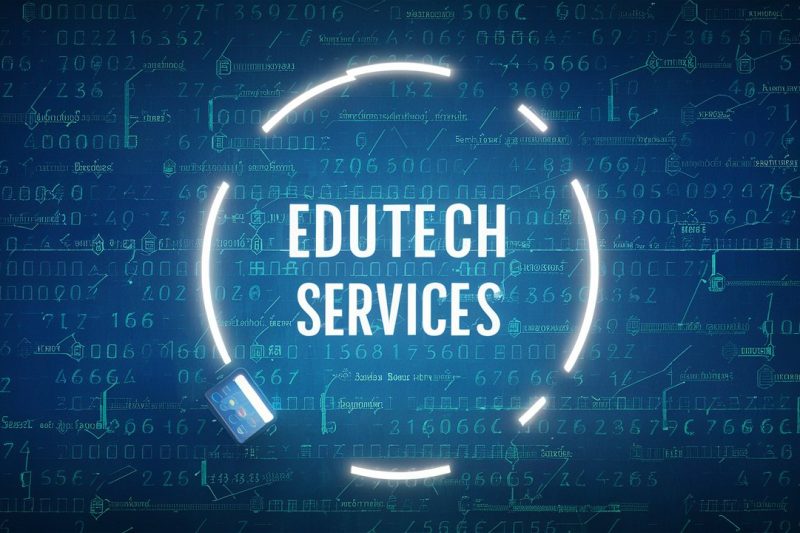EDU TECH
Key Components of Edutech Services
Learning Management Systems (LMS):
LMS platforms like Moodle, Blackboard, and Canvas are central to Edutech. They provide a structured environment for course management, enabling educators to create, distribute, and assess learning materials. LMS platforms support various content formats, track student progress, and facilitate communication between teachers and students.
Online Courses and e-Learning:
Platforms such as Coursera, Udemy, and Khan Academy offer online courses across a wide range of subjects. These platforms provide flexibility, allowing learners to access educational content at their own pace and from any location. Online courses often include multimedia elements, interactive assignments, and forums to enhance the learning experience.
Digital Classrooms:
Tools like Google Classroom and Microsoft Teams for Education enable the creation of digital classrooms where teachers and students can interact in real-time. These platforms support video conferencing, collaborative documents, and digital assignments, facilitating a seamless transition from traditional to virtual learning environments.
Educational Software and Apps:
A myriad of educational software and apps cater to different age groups and subjects. Examples include Duolingo for language learning, Scratch for coding, and Photomath for mathematics. These applications make learning engaging through gamification, interactive content, and personalized learning paths.
Virtual and Augmented Reality (VR/AR):
VR and AR technologies are transforming the educational experience by providing immersive learning environments. Applications like Google Expeditions and Nearpod VR allow students to explore historical sites, conduct virtual science experiments, and interact with 3D models, making learning more tangible and engaging.

Point of Sale (POS) services are a crucial component for businesses, particularly in the retail, hospitality, and food service industries. These services encompass the software and hardware that manage sales transactions, inventory, customer data, and other business operations. POS systems have evolved significantly, offering advanced features that enhance the efficiency and effectiveness of business operations.
Benefits of Edutech Services
Accessibility and Flexibility:
Edutech services break down geographical barriers, providing access to quality education regardless of location. They offer flexible learning schedules, catering to diverse needs, including those of working professionals and non-traditional students.
Personalized Learning:
Technology enables personalized learning experiences tailored to individual student needs. Adaptive learning software adjusts content difficulty based on student performance, ensuring that learners receive appropriate challenges and support.
Engagement and Interactivity:
Interactive tools and multimedia content make learning more engaging. Gamified elements, simulations, and interactive quizzes foster active learning and increase student motivation.
Data-Driven Insights:
Edutech platforms generate valuable data on student performance and engagement. Educators can use these insights to identify learning gaps, tailor instruction, and improve educational outcomes.
Collaboration and Communication:
Digital tools facilitate better communication and collaboration among students and between students and teachers. Collaborative projects, discussion forums, and real-time feedback enhance the learning experience and build essential 21st-century skills.
Challenges and Considerations
Digital Divide:
Access to Edutech services is not universal. Socioeconomic disparities can limit access to necessary devices and internet connectivity, exacerbating educational inequalities.
Teacher Training:
Effective integration of technology in education requires teachers to be adequately trained. Professional development and ongoing support are essential for educators to leverage Edutech tools effectively.
Privacy and Security:
The increased use of digital tools in education raises concerns about data privacy and security. Protecting student information and ensuring secure online interactions are critical considerations for Edutech providers.
Quality and Credibility:
With the proliferation of online courses and educational content, ensuring the quality and credibility of resources is crucial. Accreditation and quality assurance mechanisms help maintain educational standards.
Collaboration and Communication:
Digital tools facilitate better communication and collaboration among students and between students and teachers. Collaborative projects, discussion forums, and real-time feedback enhance the learning experience and build essential 21st-century skills.
Future of Edutech Services:
The future of Edutech is poised to be shaped by advancements in artificial intelligence (AI), machine learning, and blockchain technology. AI-powered tutors and personalized learning assistants will provide even more tailored educational experiences. Blockchain technology could revolutionize credentialing and secure the storage of educational records. As technology continues to evolve, Edutech services will play an increasingly significant role in shaping the future of education, making learning more accessible, personalized, and effective.
In conclusion, Edutech services are transforming education by leveraging technology to enhance learning outcomes, improve accessibility, and foster engagement. While challenges remain, the potential benefits of Edutech make it a critical component of modern education systems.
